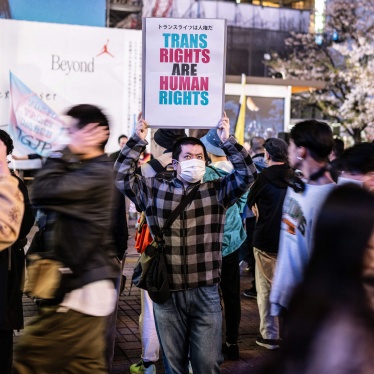Her Excellency Gloria Macapagal Arroyo
President, Republic of the Philippines
New Executive Building
Malacanang Palace Compound
JP Laurel Street, San Miguel, Manila
Dear President Arroyo:
I am writing on behalf of Human Rights Watch to express our great concern over recent threats by the head of the Movies and Television Review and Classification Board (MTRCB) to ban broadcasts showing lesbian relationships. These actions encourage discrimination and are a blatant assault on freedom of expression. They point as well to broader issues in which your intervention, in your new term as President, will be crucial: to remove the MTRCB’s sweeping powers to edit and prohibit films and programs; and to enact proposed national legislation barring discrimination on the basis of sexual orientation and gender identity.
Human Rights Watch, founded in 1978, is the largest human rights organization based in the United States. Human Rights Watch conducts regular, systematic investigations of human rights abuses in some seventy countries around the world. We work in dialogue and cooperation with governments to develop legal and policy responses to the conditions that enable abuse. We hope that this letter will open a dialogue with you concerning these important subjects.
On May 23, as you are undoubtedly aware, the Philippine Daily Inquirer reported that the head of the MTRCB, Marissa LaGuardia, had sent a memorandum to the producers of a television program, “The Buzz,” warning them about positive depictions of lesbian relationships. The memo stated that “lesbian and homosexual relationships are an abnormality of human nature. … To show such kind of abnormality/aberration on prime time TV programs gives the impression that the network is encouraging lesbian and homosexual relationships.” After another program, “S-Files,” aired the wedding of a lesbian couple on May 16, the MCRTB sent the producers a similar memorandum. It stated, “To allow lesbians or homosexuals to kiss each other on television during prime time is tantamount to saying to children who watch your program that to be lesbian or homosexual is all right.”
On May 25, Ms. LaGuardia apologized for the language used in the memos, saying she did not intend to “demean” lesbian, gay, bisexual, and transgender people’s “sexual preferences.” However, she stated that she had wanted to encourage "more responsibility and accountability from TV productions tackling highly sensitive thematic issues such as homosexuality or gender preferences."
We are grateful that Ms. Laguardia apologized. However, the censorship board’s long record of restricting freedom of expression means that its threats carry weight. We fear that Ms. Laguardia’s statements have had the effect of intimidating producers wishing to portray lesbian, gay, bisexual, and transgender people fairly—condemning part of the population not just to inequality but to invisibility.
An apology is insufficient to address the MCTRB’s broad powers to censor and ban films and broadcasts it deems unacceptable. Instead, the MCTRB should be eliminated. As you are aware, the MCTRB was created during the waning years of President Marcos’ dictatorship, by Presidential Decree No. 1986, which gave the board extensive power to “approve or disapprove [or] delete objectionable portions from” any film or television program. Among other grounds, it cited works “which tend to undermine the faith and confidence of the people in their government and/or the duly constituted authorities,” and “which serve no other purpose but to satisfy the market for violence and pornography.” Such sweeping language invites violations of the right to freedom of expression. Other censorship instruments in the Philippines have a comparable effect on this basic right. In a May 2003 report on HIV/AIDS in the Philippines, for instance, Human Rights Watch has documented similarly arbitrary conduct by the Philippine television advertising board (Adboard). Adboard censors have used their broad powers to restrict information about condoms and safer sex, adhering to the Roman Catholic Church hierarchy’s preference for HIV-prevention messages based on sexual abstinence. The suppression of this information endangers people’s right to health.
Finally, Ms. Laguardia’s memoranda singles out a group of people as unworthy to appear in television broadcasting, based solely on their sexual orientation. This violates protections enshrined in international law. Indeed, the Convention on the Elimination of All Forms of Discrimination Against Women (CEDAW), which the Philippines ratified in 1981, calls on states in its Article 5 to address “social and cultural patterns of conduct of men and women, with a view to achieving the elimination of prejudices” and of “stereotyped roles for men and women.” Programming which fosters a positive public understanding of lesbian women should be seen as consistent with that goal. Furthermore, the U.N. Human Rights Committee held in the 1994 case of Toonen v Australia that protections for equality and against discrimination in Articles 2 and 26 of the International Covenant and Political Rights (ICCPR) should be understood to include “sexual orientation” as a protected status.
It is incumbent on Philippine legislators to respect their obligation to defend rights across the board, and pass legislation prohibiting discrimination against lesbian, gay, bisexual, and transgender people. Such legislation is before the Philippine Congress. House Bill No. 2784, introduced by Representative Loretta Ann Rosales, would bar discrimination on the basis of sexual orientation and gender identity, and provides penalties for harassment by members of the police or armed forces. It passed the lower house of Congress in January 2004, but was shelved by the Senate.
The recent conduct of the MTRCB shows why this legislation is important. Discriminatory attitudes persist within the Philippines’ government. This measure is needed to defend against such discrimination. We urge you to give the measure your full support and to campaign for its passage by the Senate.
Sincerely,
Scott Long
Director
Lesbian, Gay, Bisexual, and Transgender Rights Program
Human Rights Watch







